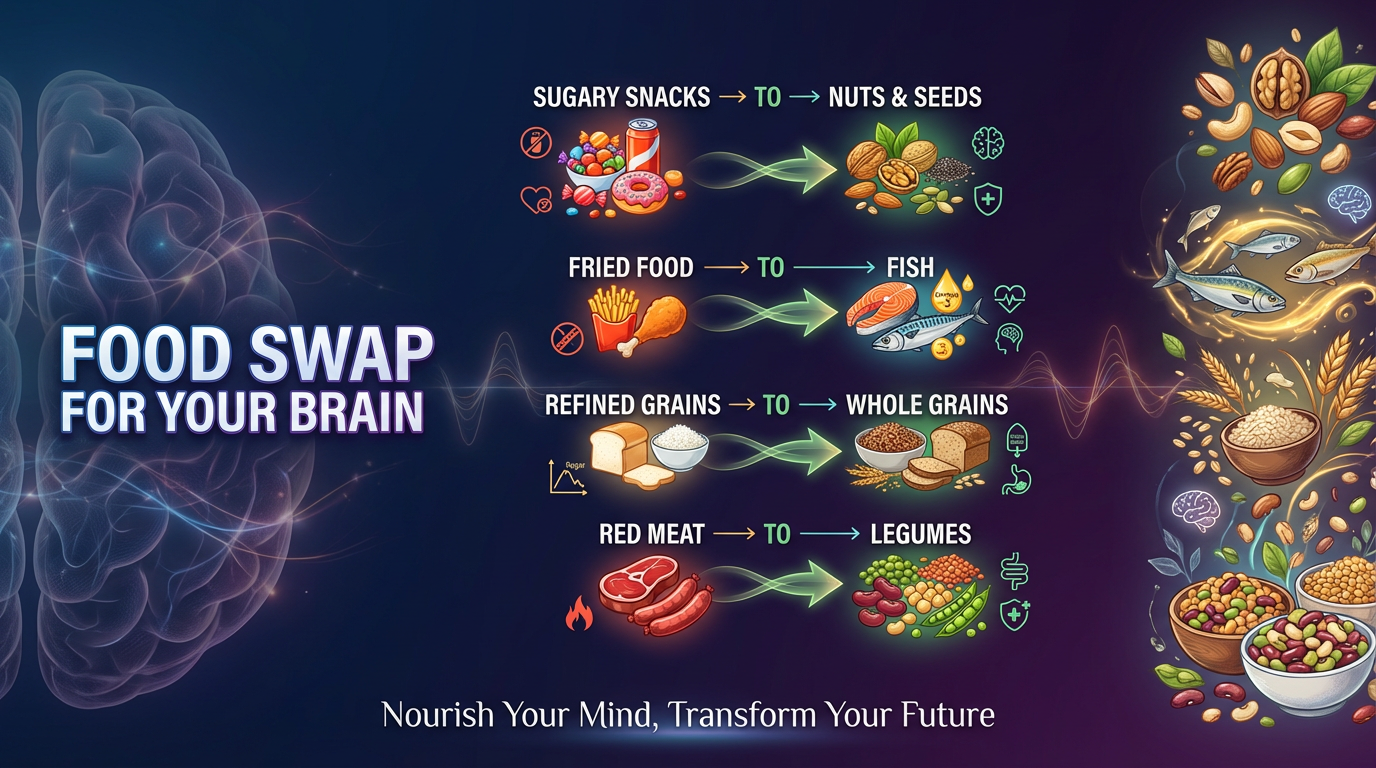Friday, 28 November 2025

Simple dietary change reduces dementia risk without sacrificing taste or satisfaction. Health expert explains how one simple daily food swap can reduce dementia risk by up to 20 per cent. Expert shares easy plant-based alternatives and practical meal swaps that taste great and protect brain health. Founder warns that processed red meat consumption accelerates cognitive aging by over a year per daily serving.
Most Americans worry about keeping their minds sharp as they age, especially with dementia rates climbing. While genetics play a major role, mounting evidence shows that what we eat today can significantly impact our brain health tomorrow.
The answer might be simpler than you think, according to Simon Greenberg, Founder of Medidex, an AI-powered medical platform that helps people access reliable health information. His advice centers on swapping one food group for another, a change that could reduce your dementia risk by 20 per cent.
“People often think protecting brain health requires dramatic lifestyle overhauls, but sometimes the most powerful changes are the smallest ones,” says Greenberg. “What we’re seeing is that replacing processed red meat with plant proteins like nuts and beans can have remarkable long-term benefits for cognitive function.”
The swap involves ditching your daily bacon, hot dogs, or deli meat sandwich for plant-based proteins. This doesn’t mean eliminating all meat. Instead, it involves reducing processed varieties that contain high levels of preservatives and sodium.
Below, Greenberg breaks down the science behind this food swap and shares practical ways to make the transition without sacrificing flavor or satisfaction.
Why Processed Red Meat Harms Your Brain
Bacon, sausage, and deli meats affect not only your waistline, but also actively work against your brain health. These foods contain nitrites and nitrates, preservatives that may trigger inflammation in brain tissue over time.
“When we look at processed meats, we’re seeing a perfect storm of compounds that can damage cognitive function,” explains Greenberg. “High sodium levels can affect blood flow to the brain, while the preservatives create oxidative stress that accelerates cellular aging.”
The numbers are striking. Each daily serving of processed red meat appears to add about 1.6 years of cognitive aging, affecting everything from memory to problem-solving skills. That morning bacon habit could be costing your brain more than you realize.
The Plant Protein Advantage
Nuts, beans, and legumes work differently in your body. These foods are packed with antioxidants that fight inflammation and healthy fats that support brain cell communication. They also provide steady energy without the blood sugar spikes that can damage brain vessels over time.
“Plant proteins come with built-in brain protection,” says Greenberg. “Walnuts contain omega-3 fatty acids, beans provide folate for neurotransmitter production, and legumes offer fiber that supports the gut-brain connection.”
Simple Daily Swaps That Actually Taste Good
Making this change doesn’t mean choking down bland tofu. Greenberg lists four practical swaps that won’t leave you missing your old favorites:
Morning Makeover: Skip the bacon and try almond butter on whole grain toast with sliced banana. The protein keeps you full, and the combination tastes indulgent.
Lunch Liberation: Replace your deli meat sandwich with a chickpea salad wrap. Mash chickpeas with avocado, add some lemon juice and herbs – it’s creamy, satisfying, and brain-friendly.
Snack Smart: Ditch the jerky for a handful of mixed nuts. Keep small portions in your car, desk, or gym bag for easy access.
Dinner Wins: Try lentil bolognese over pasta instead of meat sauce. The texture is surprisingly similar, and the flavor is rich and hearty.
Brain-Protection Tips for Mid-Life Adults
Your 40s and 50s are the sweet spot for brain protection. The changes you make now can pay dividends for decades.
“This is when prevention really matters,” notes Greenberg. “Your brain is still adaptable, but damage from poor dietary choices is starting to accumulate.”
Start small, aiming for one plant protein meal per day. Build from there as your taste buds adjust. Focus on variety to keep things interesting: black bean tacos on Monday, walnut-crusted salmon on Wednesday, tofu stir-fry on Friday.
Consider meal prep to make healthy choices easier. Cook a big batch of lentils on Sunday and use them throughout the week in salads, soups, and grain bowls.
Simon Greenberg, Founder of Medidex, commented:
“The biggest mistake people make when cutting back on processed meats is thinking they have to go cold turkey overnight. That’s a recipe for feeling deprived and eventually giving up. Instead, I recommend the ‘crowding out’ approach, which involves adding more plant proteins to your plate first, then gradually reducing the processed meat portions.
“Start by making one day a week completely processed-meat-free. Maybe it’s ‘Meatless Monday’ or ‘Plant Protein Thursday’ – whatever works for your schedule. Once that feels natural, expand to two days, then three. Before you know it, you’re eating plant proteins most of the time without feeling like you’re missing out.
“The key is finding plant-based options you genuinely enjoy. If you hate tofu, don’t force it, and try tempeh or lentils instead. Love the smokiness of bacon? Experiment with smoked paprika on roasted chickpeas. The goal isn’t perfection, but progress toward better brain health. Even reducing processed meat by half while increasing plant proteins can make a meaningful difference for your cognitive future.”